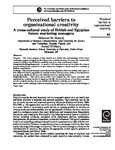Perceived barriers to organizational creativity: a cross-cultural study of British and Egyptian future marketing managers
| dc.contributor.author | El-Masry, AA | |
| dc.contributor.author | Mostafa, M | |
| dc.date.accessioned | 2017-02-06T20:22:33Z | |
| dc.date.available | 2017-02-06T20:22:33Z | |
| dc.date.issued | 2008-01-01 | |
| dc.identifier.issn | 1352-7606 | |
| dc.identifier.uri | http://hdl.handle.net/10026.1/8371 | |
| dc.description.abstract |
Purpose – The overall purpose of this research is to further the understanding of how future marketing managers in Egypt and the UK perceive creativity barriers. The paper also examines the construct validity of the barriers to creativity scale in an Arab non-Western context. Design/methodology/approach – A sample of 125 respondents was used to achieve the research purpose. Respondents completed a 17-item instrument designed to assess barriers to creativity in business organizations. Findings – Discriminant analysis results showed that Egyptians differ from British with respect to their attitudes towards organizational creativity barriers. t-test procedure confirmed also that gender and age have significant effects on the attitudes towards creativity barriers. Originality/value – This study has provided some insights into the factors associated with organizational creativity barriers in Egypt and the UK. The more is known of how future managers perceive creativity barriers, the more quickly and efficiently creativity can be stimulated. | |
| dc.format.extent | 81-93 | |
| dc.language | en | |
| dc.language.iso | en | |
| dc.publisher | Emerald | |
| dc.subject | 35 Commerce, Management, Tourism and Services | |
| dc.subject | 3503 Business Systems In Context | |
| dc.subject | 3504 Commercial Services | |
| dc.subject | 3506 Marketing | |
| dc.subject | 3507 Strategy, Management and Organisational Behaviour | |
| dc.title | Perceived barriers to organizational creativity: a cross-cultural study of British and Egyptian future marketing managers | |
| dc.type | journal-article | |
| dc.type | Article | |
| plymouth.issue | 1 | |
| plymouth.volume | 15 | |
| plymouth.publication-status | Published | |
| plymouth.journal | Cross Cultural Management: An International Journal | |
| dc.identifier.doi | 10.1108/13527600810848845 | |
| plymouth.organisational-group | /Plymouth | |
| plymouth.organisational-group | /Plymouth/Faculty of Arts, Humanities and Business | |
| plymouth.organisational-group | /Plymouth/Faculty of Arts, Humanities and Business/Plymouth Business School | |
| plymouth.organisational-group | /Plymouth/REF 2021 Researchers by UoA | |
| plymouth.organisational-group | /Plymouth/REF 2021 Researchers by UoA/UoA17 Business and Management Studies | |
| dcterms.dateAccepted | 2008-01-01 | |
| dc.rights.embargoperiod | Not known | |
| rioxxterms.versionofrecord | 10.1108/13527600810848845 | |
| rioxxterms.licenseref.uri | http://www.rioxx.net/licenses/all-rights-reserved | |
| rioxxterms.type | Journal Article/Review |


